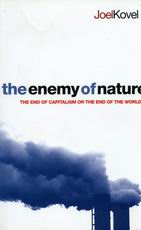
The Enemy of Nature
The End of Capitalism or the End of the World?
Kovel, Joel
Publisher: Zed Books
Year First Published: 2002
Year Published: 2007
Pages: 329pp ISBN: 978-1-84277-871-5
Library of Congress Number: HC79.E5K68 2007 Dewey: 333.7
Resource Type: Book
Cx Number: CX8235
We live in and from nature, but the way we have evolved of doing this is about to destroy you. Capitalism and its by-products -- imperialism, war, neoliberal globalization, racism, poverty, and the destruction of community -- are all playing a part in the destruction of our ecosystem.
Abstract:
John Kovel is a Professor of Social Studies at Bard College and has been actively involved in green politics. The title of his book, The Enemy of Nature: The end of capitalism or the end of the world?, is enough to make the reader realise that the author considers capitalism, and its by-products, to be nature's (and man's) worst enemy and that he feels that a world with capitalism cannot exist for long. He argues against the claim that a better environment can be achieved through the current Western way of being.
Divided into three parts -- "The culprit," "The domination of nature," and "Paths to ecosocialism" -- the book deals with three major aspects of this theory. The first section explores whether this theory is true by defining the ecological crisis and by discussing what capital is and how it affects the ecosystem. The second part of the book brings the concept of capitalism out of an economic context and into an ecological one. Capital is regarded as "a whole way of being" that "has to be radically transformed if the ecological crisis is to be overcome". The last section deals with the question of what has been done, and what must be done, to deal with this problem. The book is therefore a political, economic and scientific discussion, not limited to any one aspect of the ecological crisis.
[Abstract by Nabeeha Chaudhary]
Excerpts:
Corporations are as much the object of globalization as its subject. As we have seen in the instance of Bhopal, the corporation is itself moved by the gigantic force field of capital in which it is suspended, and is given life to the extent that it fosters accumulation. And for another, states play a role in the accumulation of capital which is just as fundamental as that of the corporation - only imagine what would happen if the process were entirely turned over to the latter, with no governmental process to regulate and enforce.
...
global capitalism exists along a continuum extending from the dignified chairman of the Federal Reserve Bank to the most vicious Russian mobster and Colombian drug lord. All are mandated by the great force field and under its spell.
...
For if capital were natural, why has it only occupied the last 500 years of a record that goes back for hundreds of thousands? More to the point, why did it have to be imposed through violence wherever it set down its rule? And most importantly, why does it have to be continually maintained through violence, and continuously reimposed on each generation through an enormous apparatus of indoctrination?
...
Industrialization is not an independent force, the, but the hammer with which nature is smashed for the sake of capital. Industrial logging destroys forests; industrial fishing destroys fisheries' industrial chemistry makes Frankenfood; industrial use of fossil fuels creates the greenhouse effect, and so forth - all for the sake of value-expansion.
...
The history of capital may be viewed as a never-ended battle to take over collective and organic relationship and replace these with commodity relationships, which is to say, to create private property by destroying the Commons, and to embed this in the accumulation of capital.
...
Capital is more than happy to enlist mainstream enviros as partners in the management of nature. Big environmental groups offer capital a threefold convenience: as legitimation, reminding the world that the system works; as control over popular dissent, a kind of sponge that sucks up and contains the ecological anxiety in the general population; and as rationalization, a useful governor to introduce some control and protect the system from its own worst tendencies, while ensuring the orderly flow of profits.
Subject Headings


